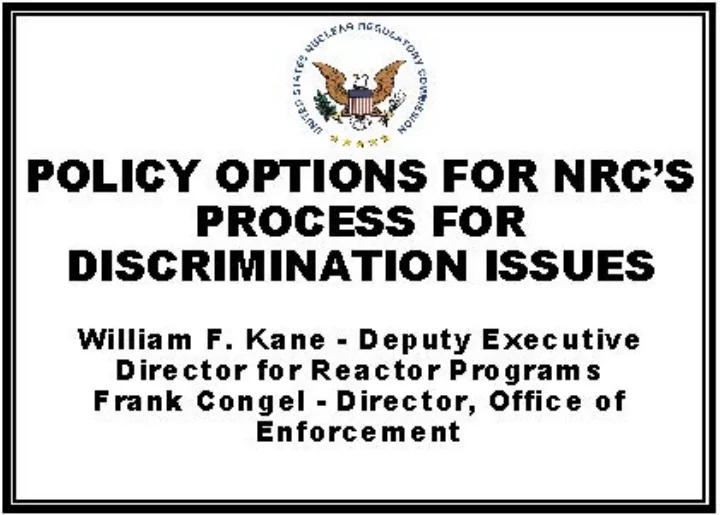

Slide 1 of 14 POLICY OPTIONS FOR NRC'S PROCESS FOR DISCRIMINATION ISSUES William F. Kane· Deputy Executive Director for Reactor Programs Frank Con gel· Director, Office of Enforcement
Discrimination Task Group (DTG) Background • Formed in April 2000 • Evaluated NRC's process for handling matters related to employee protection standards • Proposed recommendations for improvement
Slide 3 of 14 DTG Background Cont'd • Conducted meetings in the regions and public meetings throughout the country • Draft report issued in April 2001 •Additional meetings held and expanded scope of review • Final report issued in April 2002
Slide 4 of 14 Overview of Comments •Improve process timeliness • Prior release of Office of Investigation (01) documents •Investigative technique concern •Whistleblower assistance •Aggressive NRC pursuit of these cases is unnecessary and can lead to chilling effect on management
Slide 5 of 14 Evaluation of Basic Policy Questions •Should NRC continue to be involved in discrimination matters? •Should the NRC base actions on individual cases of discrimination or focus on Safety Conscious Work Environment (SCWE)?
Slide 6 of 14 Basic Policy Questions Cont'd •Should the NRC investigate individual cases or rely on the Department of Labor (DOL)? •Should the NRC base actions on the underlying risk significance of the technical issues associated with a complaint?
Slide 7 of 14 DTG Recommendations • No single proposal would address all the concerns that exist • Raise threshold for 01 referral • Resequence enforcement conference • Eliminate DOL referral • Evaluate use of Alternative Dispute Resolution (ADR)
Slide 8 of 14 DTG Recommendations Cont'd • Release 01 reports prior to enforcement conference • Rule making to allow issuance civil penalties to licensee contractors •Assessment of 01 investigative techniques
Slide 9 of 14 Senior Management Review Team • Reviewed the DTG's findings and recommendations • W. F. Kane, DEDR • C. J. Paperiello, DEDMRS • S. J. Collins, NRR • M. J. Virgilio, NMSS • L.A. Reyes, Region II
Slide 10 of 14 Senior Management Key Considerations • NRC strategic performance goals • Risk-informed and performance- based framework •Clarity and predictability in NRC programs • Licensee experience and stakeholder comments
Slide 11 of 14 Senior Management Conclusions • Interim modifications to current process, incorporating the DTG's streamlining recommendations, to address stakeholder concerns • SCWE rulemaking, incorporating key elements of current NRC employee protection provisions, is recommended for the longer term
Slide 12 of 14 SCWE Rulemaking Vision • Licensees establish and implement SCWE programs • NRC would oversee licensee programs through inspection • NRC's role shifts from reactive to proactive • Reduced perception of dual regulation with DOL
Slide 13 of 14 Proposed Attributes of SCWE Rule and NRC Oversight Program •Graduated SCWE program for different classes of licensees • Employee and supervisor training and communication • Performance measurement and indicators
Slide 14 of 14 Expected Outcomes • Maintain safety •Increase public confidence • Make NRC activities and decisions more effective, efficient, and realistic • Reduce unnecessary regulatory burden
Recommend
More recommend